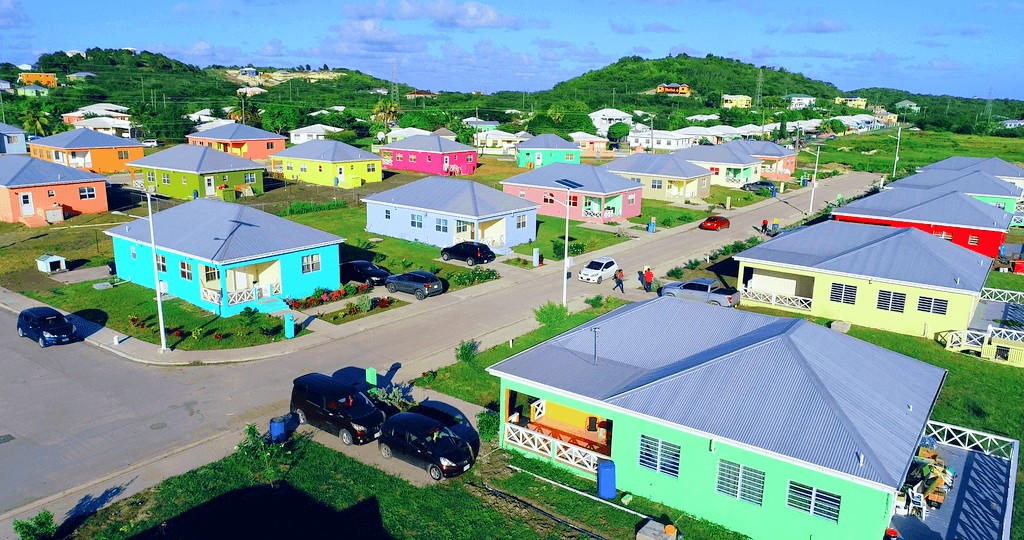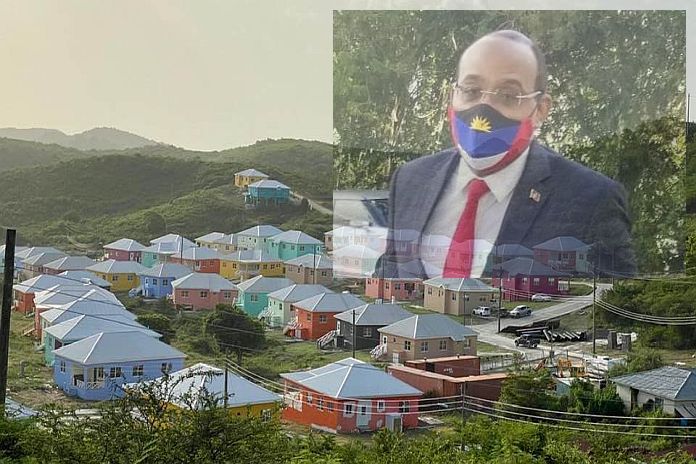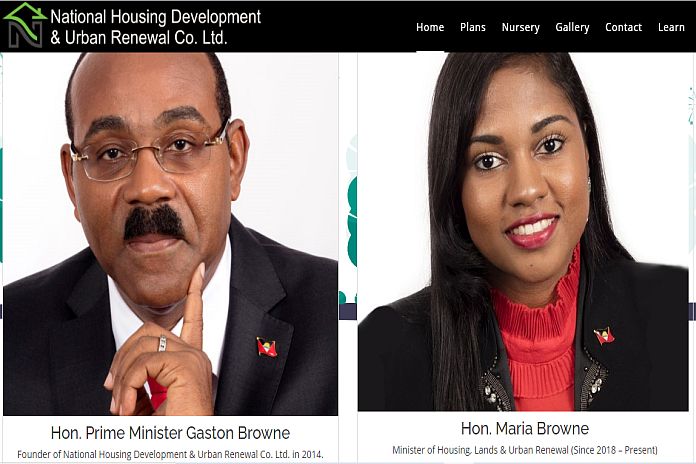Prime minister and minister for finance, corporate governance and public-private partnerships, Gaston Browne, on Thursday, January 28, 2021, presented the 2021 budget statement, amid the “overriding issue on everyone’s mind is COVID-19 – and its devastating effects”.
In this series prime minister Browne outlines – Antigua Housing Revolution and Development of Barbuda

By Caribbean News Global contributor
ST JOHNS, Antigua – The government of Antigua and Barbuda will make considerable investments in 2021, despite constrained circumstances. The Housing Revolution and Development of Barbuda is part of the major public sector investments.
The National Housing and Urban Renewal Company, is the primary vehicle through which this administration is delivering on its promise to transform the housing stock in Antigua and Barbuda. While the protocols to control the spread of COVID-19 slowed the company’s activities in 2020, it was still able to complete and deliver 80 homes to homeowners. In 2021, the company expects to deliver the keys to another 160 proud homeowners.
The Booby Alley housing project will be greatly advanced in 2021. With residents moving into temporary housing, construction will start on new, climate-resilient homes for Booby Alley residents. This is part of a larger $100 million affordable homes project, that is being funded with a grant from China. In all, 250 homes will be constructed at several locations on Antigua and Barbuda.
I announced in budget 2020 our plan to accelerate the construction of houses, by selling lands at concessional rates to local contractors and developers, who would build affordable homes for sale to citizens and residents. This initiative is being managed by the Central Housing and Planning Authority (CHAPA).
The response from contractors and developers has been positive. CHAPA has allocated 917 parcels of land in North Sound, Lightfoot, Jennings, Seatons, Cades Bay, Judges Hill, Bolans, Dunbars, Lindsey’s, and Willikies.
Over the next 18 months several contractors, will construct 629 houses in these areas at an estimated cost of $200 million. These houses will be sold to Antiguans and Barbudans at prices ranging from $180,000.00 to $330,000.00.
Additionally, the Construct Antigua Barbuda Initiative (CABI), continues to support our people in constructing their homes. In 2020, 114 projects valued at $36.3 million were approved for CAB-I concessions. However, the land distribution process was delayed in 2020, we were able to allocate 64 parcels of crown lands.
Distribution of lands will be boosted this year, with parcels of land to be made available in Cedar Valley, Piggots, Old Road, Freetown, Glanvilles, Donovans, Monks Hill, Montrula, and Piccadilly. Included in this land distribution drive, are special provisions for the sale of 900 parcels of land to young Antiguans and Barbudans through the Land for Youth initiative.
The government will join the United Nations Office for Project Services (UNOPS), and Sustainable Housing Solutions (SHS), in an exciting and innovative project designed to deliver 10,000 affordable homes across the Caribbean. At least 3,000 of these houses will be allocated to Antiguans and Barbudans.
This project, which is part of UNOPS’s Sustainable Infrastructure Impact Investment initiative, will be implemented over a period of ten years and will generate an initial US$30 million in private investment. The houses constructed under this project will boast energy-efficient solar panels, waste to energy technology, and mosquito repellent coating.
The initiative also involves establishing a factory in Antigua and creating sea transport services, for the movement of building materials to the islands, that will benefit from the delivery of these resilient houses.
The gross development value of the homes is an estimated US$500 million, and we stand to benefit, not just in terms of the delivery of houses, but in terms of jobs and increased incomes for our people.
Here are the projects which will be advanced, and which are of importance to our people:
Roads
Having substantially completed works on the Friars Hill Road and Sir George Walter Highway, work began on the second phase of the road rehabilitation project in 2020.
- This EC$65.6 million project involves the reconstruction of Anchorage Road, Old Parham Road, Sir Sydney Walling Highway, and Valley Road North.
The contractor has started work on the Sir Sydney Walling Highway and should begin work on the other roadways later this year.
- The third phase of the road rehabilitation project will be undertaken as part of a US$28.7 million Rehabilitation and Reconstruction Loan (RRL) project.
This project focuses on rehabilitating and reconstructing critical infrastructure.
- It includes an allocation of US$10 million to help finance the reconstruction of Darkwood Bridge, Herbert’s Main Road, Burma Road, and Royal Gardens Road.
The funding for these projects comes from loans obtained from the Caribbean Development Bank. The government will also continue its road repair and maintenance programme and installation of concrete roads in several communities across the country. To facilitate and accelerate this process, a concrete plant is being acquired.
Electricity and Water
Electricity and water, amid the adverse effects of the COVID-19 pandemic, government caused APUA to reduce the fuel variation charge on electricity and offer discounts for residential and commercial users. The value of this relief was $21.8 million.
Farmers received a 25 percent reduction in their water bills to encourage increased food production. The government insisted on providing this relief to the people of this nation, at a time of great adversity.
Despite this significant loss of revenue, APUA intends to increase electricity generation capacity by 25-30 Megawatts very shortly.
We are determined to make electricity outages a thing of the past. It will take funding, including the timely payment of bills by households and by businesses.
… Last October, APUA began work on installing an additional reverse osmosis plant at Ffreys Beach. This plant, valued at US$2 million, was provided by the government of Japan and is expected to increase daily production by 400,000 gallons.
The installation of reverse osmosis plants at Fort James and Bethesda will be a priority in 2021, increasing water production by 3.5 million gallons daily. Further, to ensure the reliability of supply, APUA is implementing a $30 million re-piping project to help reduce water loss.
Our financial circumstances are acute, but we are striving to install the infrastructure that will serve us well, as our economy revives and re-energizes.
Telecommunications
We can all agree that affordable and efficient telecommunications infrastructure is vital to the economic and social life of our country. It is unimaginable how commerce, international relations, financial services, education, and entertainment, would have been possible in the epoch of COVID-19 without reliable telecommunications.
… The important lesson we have all learned is that we must maintain and improve telecommunications. In this regard, APUA has secured US$30 million, to install its own sub-sea cable, providing more reliable, cost-effective, high-speed internet service.
The world is the customer, and that customer can be serviced from within our shores. The government is providing the means. Our enterprising people must seize the enormous opportunities, to stake a claim in the global digital business sector.
Development of Barbuda

Barbuda is always a subject dear to my heart. The improvement of life on Barbuda and the economic empowerment of every Barbudan, as equal citizens of our single state, are articles of faith of our government.
There is no question that public and private sector projects have boosted economic activity on Barbuda and provided hundreds of jobs for its residents. The government will continue to collaborate with the Barbuda Council, to deliver more than $100 million of planned investment for the benefit of all Barbudans.
Work has started on a number of these projects including the Sir McChesney George Secondary School on which $6.5 million has already been spent.
Other public sector projects to be executed on Barbuda include:
- Construction of a new Disaster Office;
- Construction of a Multi-purpose Centre/Disaster Shelter;
- Construction of a Reverse Osmosis Plant and Storage Tank;
- Development of Agricultural Infrastructure;
- Completion of the Barbuda Energy Resilience Project, which is being funded with a UK-CIF grant of about $10 million;
- Additionally, completion of the new Barbuda airport at a cost of US$8 million, is a priority in 2021.
A Barbuda Masterplan, currently being finalized, envisages the establishment of a new capital city at Louis Hill. This masterplan is based on the joint vision of the Barbudan people, the Barbuda Council, and the government.
The development of the Louis Hill area includes:
- The Wa’omoni Cottages housing project funded by the Prince’s Foundation and the Calvin Ayre Foundation, in which 20 disaster-resistant homes will be constructed for Barbudans, whose houses were destroyed during hurricane Irma.
The government and the Halo Foundation will also contribute to this initiative, that is intended to help make Barbuda more climate-resilient.
- The UNDP Project to construct 150 homes started in 2020 and will continue this year.
This project is being funded with a grant from the European Union and has already repaired and rebuilt 20 homes.
- The construction of the New Holy Trinity Primary School, which will be primarily funded by the government of the Dominican Republic.
Also, Barbuda will benefit from the $100 million housing development grant, that has been provided by the Peoples Republic of China to our country. Barbuda, and all those who inhabit it, can look forward to advancement and progress that government is determined to deliver.
- Social security
The significant reduction in the number of contributors to the Social Security Scheme has affected its cash flow unfavourably. Therefore, the Scheme has been unable to meet pension obligations in a timely manner. The government is conscious of the grave difficulties this situation poses to pensioners and the alarm and fear that they experienced. Government has intervened to help, even in the most challenging financial circumstances.
In 34 years, between 1979 and 2013, successive governments paid a total of $88.2 million into Social Security. In just six years, between 2014 and 2020, my administration paid twice the amount paid by previous governments in 24 years.
We paid over $170 million into the Scheme. That is the concrete, indisputable evidence, of how much this administration cares for the people of this country, including our pensioners, who deserve to be free of anxiety in the twilight of their years.
Given this reality, it is farcical that the very persons who did not pay contributions to the Scheme when they were in power, encourage innocent pensioners to picket the government.
Politics does not get any lower than that. The government will continue to pay more than its required contributions, to help bridge the gap created by those private-sector contributors who are unemployed at this time.
As the world economy recovers, we in Antigua and Barbuda can expect a gradual return to pre-COVID levels of employment. Cash flow for Social Security will improve and pensions and benefits will be made in a timelier manner. Until then, the nation can be assured that our government and Social Security will pursue initiatives to manage the situation.
These include making payments to the most vulnerable pensioners first, ensuring compliance by private sector employers who are still operational, and by introducing a voluntary contributions programme.
The most vulnerable pensioners are:
- The most elderly;
- Pensioners with disabilities; and,
- Pensioners who have no other means of income, including occupational pension, or support.
This Labour Party administration cares. And, we not only say what we mean, we mean what we say.
- Medical benefits
It is well known that our nation’s Medical Benefits Scheme (MBS), established in 1978, is a unique institution that does not exist anywhere else in the Caribbean.
Over the years, its crucial role has expanded, playing a large role in funding the healthcare system, including the Mount St John’s Medical Centre. The economic fall-out from COVID-19 resulted in a nearly 18 percent reduction in MBS revenues, to which the government responded swiftly.
We increased our transfers to the MSJMC and helped MBS to streamline and restructure its debt financing and expenditure arrangements. MBS did not collapse, and it gave stalwart service to the people, at one of the most stressful periods in the history of our nation.
Approximately $115 million was spent on healthcare in 2020. This is not only good governance; it is unquestionably good performance.
- Climate change and building resilience
Our country suffered loss and damage amounting to approximately $767 million from two extreme climate events – hurricane Irma in September 2017 and the November 2020 tropical disturbance, which dumped approximately 15 inches of rainfall over a 28-hour period.
Apart from damage to critical infrastructure and other public and private sector assets, these climate events cause disruptions to economic activity, which then translate into lost revenues and a corresponding spike in unbudgeted expenditures for the government.
The total cost of these two climate events may well have been in the region of $1 billion. We are deeply conscious that, long after the COVID-19 pandemic passes, we will still be vulnerable to the ravages of Climate Change.
Antigua and Barbuda will continue to be front and centre in demanding climate action from the international community, while at the same time building our resilience through targeted actions, to adapt and mitigate against the effects of climate change.
Following our successful negotiations with the Green Climate Fund for new financing in 2020 for US$32 million, the government will once again prepare additional projects for submission.
Notably, we are developing solutions to increase the climate resilience of our country, including in energy, the built environment, agriculture, and the financial sector. Building resilience will permeate all aspects of our economy, so that, in the event of future climate-related events, we can bounce back quicker and stronger than before.
Antigua and Barbuda will lead the charge of the Association of Small Island Developing States (AOSIS) at the United Nations for the next four years. AOSIS has been essential in pressing the United Nations, to advance the Climate Change agenda since 1989.
Related: Part 2
Concluding this series … Part 4 – Budget 2021 projections and allocations







